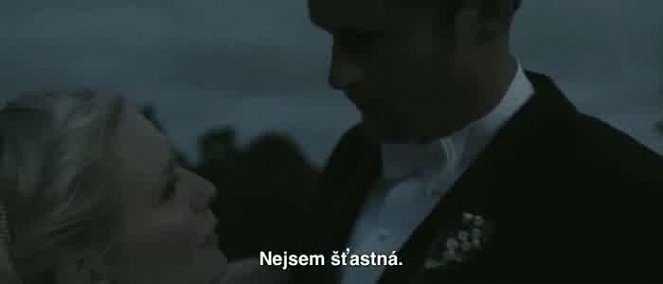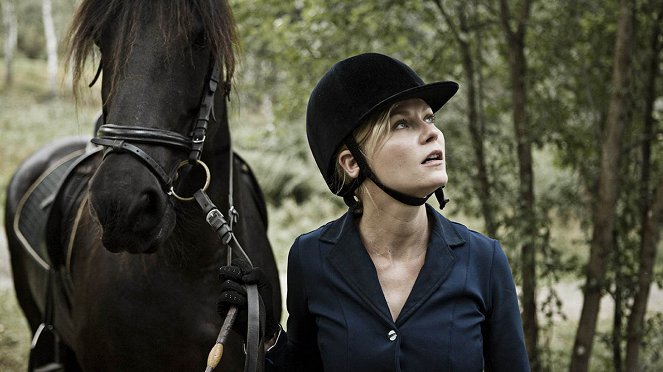Directed by:
Lars von TrierScreenplay:
Lars von TrierCinematography:
Manuel Alberto ClaroCast:
Kirsten Dunst, Charlotte Gainsbourg, Kiefer Sutherland, Charlotte Rampling, Udo Kier, Alexander Skarsgård, Stellan Skarsgård, John Hurt, Jesper Christensen (more)VOD (4)
Plots(1)
Justine (Kirsten Dunst) and Michael (Alexander Skarsgård) are celebrating their marriage at a sumptuous party in the home of her sister (Charlotte Gainsbourg) and brother-in-law (Kiefer Sutherland). Meanwhile, the planet, Melancholia, is heading towards Earth... Melancholia is a psychological disaster movie from director Lars von Trier. (Magnolia Pictures)
(more)Videos (2)
Reviews (12)
They should have cast Bruce Willis instead of Sutherland; only with that savior of our plant “asteroid my ass" would Trier throw an ironic grin at the audience; Jack Bauer is just too little time for something of that caliber. But seriously, now... A surreal “music video" of Wagner, Forman-style wedding and Trier in an intimate, emotional, but still visually most powerful ever end of the world. Several parts of it really manage to get across that specific atmosphere and the feelings typical for states of melancholy which you see/experience very rarely in movies.
()
A pure pleasure. The opening is flawless, the finale fatal. It is excellent for lovers of Richard Wagner and Kirsten Dunst's bust and dimples. The pleasure is multiplied, of course, in the Justine section, which has everything and lacks nothing. Humor is combined with absurdity and symbolism. Why waste the primitive aspects of Udo Kier when we have Alexander Skarsgård's wonderful newlywed games? He hasn't been this close to orgasm since True Blood, and that's saying something.
()
The first, not very exciting (worthy of three-stars) half is excellently acted, with a nice variety of international stars in supporting roles. However, it doesn’t bring anything more to the table than any conversation scene from any of Trier’s (or Ozon’s) other films. The second (four-stars), more oppressive, more impressive, visually beautiful half of the film, which is also more interesting in terms of the script, intensifies the experience, resulting in the audience being dazzled by the artistic audiovisuals but perplexed and unfulfilled by the content. It’s as if Trier was just experimenting, trying to materialize a feeling, an idea from a short verse. For some, it may be an interesting and clever meditation (after all, it is an extremely elegant game with pictures, music and characters), but for me Melancholia remains only a handful of positive impressions rapidly fading away after the end credits.
()
There aren't many male authors who write out their feelings and then let women play it out. I consider Melancholia one of the most honest authorial statements of recent years and the opening prologue with slow motion shots and Richard Wagner's impressive music an aesthetic orgasm. What the 19th hole meant is, I don't think, very indicative (I can already see Von Trier laughing under his beard as he reads the various nonsensical explanatory theories).
()
It’s impossible to prepare oneself for Melancholia and the end of the world. Von Trier manages to capture that mood when there’s nothing you can do with a similar sense of urgency as Bergman. But he angers more people and additionally has Earth destroyed. Melancholia is a logical follow-up to Antichrist, which involved a clash between a man and a woman. This time, the clash is between two sisters, two approaches to life and ultimately two planets. The depressive Justine passively accepts her fate. She knows that she can’t change anything. At the same time, she represents extreme individualism. She would rather stay at home alone than submit to social conventions. Claire cares more about others. She doesn’t resign herself to the situation, but she wants to have it under control. Only at the end they switch roles and one finds understanding for the other. In its own way, it is a happy ending that, at the same time, shows how we spend our whole lives running away from the thought of death into magical caves, which can take different forms for everyone, but in the end they are of little help. Melancholia is also a biting polemic on American disaster movies, which conversely try to convince us that tragedy can be averted with human action and ingenuity (and Bruce Willis). Instead of a saviour, von Trier only offers two possible ways to accept the inevitable. On top of that, he forces us to spend the last hour before the end of the world with decadent representatives of high society who are definitely not bearers of noble qualities and have enough problems of their own. He thus doesn’t offer many reasons to wish for the end not to come, which I find more honest than the Hollywood approach. 85%
()



Ads